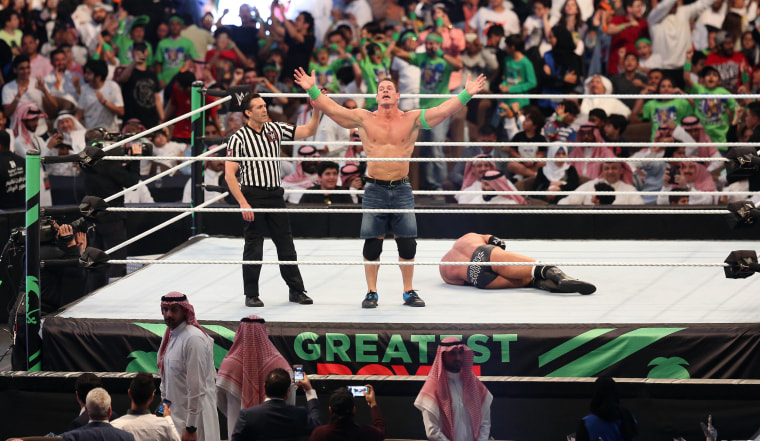When news broke of the disappearance of Saudi journalist Jamal Khashoggi from the Saudi Arabian consulate in Istanbul, international condemnation was (mostly) swift. Although U.S. President Donald Trump spent days twiddling his thumbs and protesting that the kingdom should be considered innocent until proven guilty, German Chancellor Angela Merkel declared all deals between her country and Saudi Arabia were suspended for the time being. Companies like J.P. Morgan and Google pulled out of a global investor’s conference dubbed the “Davos in the Desert.” Even U.S. Treasury Secretary Steven Mnuchin, UK trade minister Liam Fox and World Bank president Jim Yong Kim eventually stayed away too.
But Crown Prince Mohammad bin Salman still has some friends left. Despite the protests of both fans and WWE stars, Vince and Linda McMahon and World Wrestling Entertainment are continuing their partnership with the kingdom as if nothing has happened. On Friday, the WWE presents a huge pay-per-view event live from Riyadh, Saudi Arabia called “Crown Jewel.”
It is now clear that Khashoggi was murdered and his body dismembered in October, a shockingly brazen act (and attempted cover-up) carried out by agents of Saudi Arabia on foreign soil. Besides causing an international incident, Saudi’s brutality has undermined the young crown prince’s perception as a reformer. Case in point, the government sponsored high-profile initiative known as Saudi Vision 2030. This “vision” was mainly a pivot away from oil and towards recreation and tourism. The country partnered with Disney, for instance, to run “Black Panther” in theaters, the first American movie to break the country’s cinema ban in 35 years.
In this context, a partnership with professional wrestling was not surprising. The wrestling franchise is incredibly lucrative, as highlighted by its recent, $1 billion, five-year deal to air “Smackdown” on the Fox broadcast network starting in October of 2019. The WWE Network, the company’s standalone streaming channel, has been an overwhelming success. Having conquered most of the North American continent and the UK, the franchise has already launched other initiatives overseas, including in India and China. A foothold in the Middle East feels like a logical next step.
But this foothold comes with a steep moral price. Not only does the McMahon family have to overlook the Saudi government’s glaring human rights abuses, it must also comply with Saudi “decency” laws which are used most often to police women’s bodies. To that end, the WWE agreed to bring zero women with them to Saudi Arabia to perform.
Not only does the McMahon family have to overlook the Saudi government’s glaring human rights abuses, it must also comply with Saudi “decency” laws.
The WWE has long functioned like a weird traveling circus which holds up a funhouse mirror to our current society mores. Want to know who Middle America things the current enemies are? Turn on WWE’s flagship show, “Raw,” on USA and see who is playing the obvious “villain” character. (This is one of the many things Netflix’s “GLOW” gets right about the business.) Thus, in 2016 and at the height of Hillary Clinton’s presidential campaign, the WWE made a forceful push of its own to bring gender equality to its shows.
For decades, women’s matches were, to put it bluntly, beer breaks. Labeled as the “Divas” division from 2008-2016, female wrestlers like Michelle McCool and the Bella Twins competed over a “Butterfly Belt” fit for a Barbie doll. (It was pink and purple and shaped like a butterfly.) More serious matches involved hair pulling. Nearly all the “divas” pulled double duties as pin-ups and reality show stars.
Every so often, someone like Beth Phoenix or Chyna would gain some semblance of fame on their own, but the show never knew what to do with them, alternately presenting them as freaks or over-feminizing them for ridicule, putting them in outfits that didn’t fit and having matches that revolved around their underwear. In short, almost no one took women’s wrestling seriously in this testosterone-fueled business.
But that’s changing. The WWE has added an impressive roster of real wrestlers, including MMA star Rhonda Rousey. The “Divas” label was technically discontinued in 2016. The belts women compete for are now comparable to the ones held by the men. Over the last year, women have also participated in matches once reserved only for men, like the Iron Man and Steel Cage matches.
And on Oct. 28, 2018, the WWE held its first all-female pay-per-view special, "WWE Evolution," proving that the franchise’s female roster is now robust enough to support a four-hour extravaganza. WWE Evolution featured matches of a historical nature, where women like Charlotte Flair (daughter of WWE legend Ric Flair) fought their opponents using tables, ladders and chairs. It may sound ridiculous, but when Becky Lynch launched herself from the top of an 8-foot ladder, the crash you heard when the announcer’s table collapsed was akin to wrestling’s glass ceiling being shattered.
That the WWE would travel to Saudi Arabia leaving close to 50 percent of its roster behind is a serious step backwards. (As a result, the franchise was also forced to pull several male wrestlers out of retirement to fill out the card, even before some wrestlers began individually dropping out.)
The erasure of women during the WWE’s first Saudi pay-per-view shot, “The Greatest Royal Rumble,” held back in March, was downright creepy. One promo with a few seconds long shot of female wrestlers stayed in, causing a fuss in Saudi Arabia and prompting a promise that it would not happen again.
The WWE insists it plays along with the laws for now but hopes that it can help modernize the culture incrementally. In interviews, executives claimed the decision to not cancel “Crown Jewel” was a tough one. Given the circumstances, though, craven, money grubbing or just downright spineless feel like more apt descriptors.
